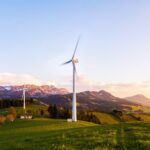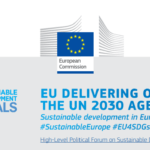Upcoming meetings
| INSTITUTIONS | MEETINGS |
| DATE | |
| Comisión Europea | 18.06.2020 Executive Vice-President Timmermans holds a videoconference with Mr Jonathan Wilkinson, Minister for Environment and Climate Change of Canada |
| Consejo Europeo | 23.06.2020 Video conference of environment ministers |
June 11, European Commission: Blue sectors contribute to the recovery and pave way for EU Green Deal
The European Commission published the “EU Blue Economy Report 2020”, which provides an overview of the performance of EU economic sectors related to the oceans and the coastal environment. With a turnover of EUR 750 billion in 2018, the EU’s blue economy is in good health. In 2018 there were also 5 million people working in the blue economy sector, a significant increase of 11.6% compared to the previous year. Although sectors such as coastal and marine tourism, fisheries and aquaculture are severely affected by the coronavirus pandemic, the Blue Economy as a whole has enormous potential in terms of its contribution to ecological recovery.
While the marine environment is often associated with traditional activities such as fisheries or transport, it is home to a growing number of emerging and innovative sectors, including marine renewable energy. The European Union, a world leader in ocean energy technology, is on track to produce up to 35% of its electricity from marine sources by 2050.
For the first time, the report addresses in detail the environmental dimension of the blue economy, thus also contributing to the achievement of environmental goals. With a 29% decrease in CO² per unit of gross value added between 2009 and 2017, the growth of fisheries and aquaculture is now firmly decoupled from the production of greenhouse gases. In addition, the report highlights the correlation between sustainable fisheries and positive economic performance.
Greening is also ongoing in other sectors. Fuelled by the International Maritime Organisation’s 2020 sulphur cap, maritime transport is looking increasingly towards less carbon-intensive energy sources. In addition, a network of “green ports” is reducing the ecological footprint of these economically important hubs between the ocean and the mainland.
The report also examines the economic value of various ecosystem services provided by the ocean, including habitats for marine life, carbon sequestration and processes that influence climate change and biodiversity.
More information
2020 Blue Economy Report: Blue sectors contribute to the recovery and pave way for EU Green Deal
June 9, European Council: Aviation emissions
The Council adopted a decision adapting the EU’s position on the reference period to be used for measuring the growth of CO2 emissions in international aviation, in order to take account of the unprecedented drop in air traffic due to the coronavirus crisis.
The reference period determines the emissions stabilisation target to be achieved by international aviation under the Carbon Offset and Reduction Scheme for International Aviation (CORSIA). It therefore also determines the amount of offsets that airlines have to purchase in order to meet that target. CORSIA was agreed by the International Civil Aviation Organization (ICAO) in 2016. The baseline established in 2018 consisted of the average CO2 emissions from international aviation covered by CORSIA during 2019 and 2020.
In accordance with the EU position set out in the decision, the amended base period for the emission values used to calculate the growth factors should refer to the emission levels of 2019.
- CORSIA
The ICAO Council will discuss the CORSIA baseline during its 220th Session from 8 to 26 June 2020.
The purpose of CORSIA is to contribute to the objectives of the Paris Agreement to address climate change in the context of international aviation. It complements a broader set of measures, including improvements in aircraft technology, operational improvements and sustainable aviation fuels, to achieve carbon-neutral growth from 2020 onwards.
CORSIA will be reviewed every three years. The first review is scheduled for 2022 and the pilot phase is expected to start in 2021.
More information
June 8, Cordis: Bringing solar manufacturing back to its European roots
A European Union initiative is supporting the development of an assembly solution for producers of building-integrated photovoltaic (PV) panels.
With continued efforts to accelerate the deployment of PV systems, which are already expanding faster than any other renewable energy source, it is essential to boost investment in this area. In this respect, the PV Impact project aims to stimulate private sector investment in PV research, development and innovation throughout the European Union.
This is essential, especially now, when the unprecedented impacts of the PV-19 health crisis continue to spread, highlighting various weaknesses in several industries such as solar energy. Recognizing the high dependence of the industry on photovoltaic panels and cells manufactured in Asia, the French company SOLEAN has set out to help European PV panel manufacturers, particularly small businesses, to operate more economically and efficiently. SOLEAN has joined forces with Photowatt, a registered trademark of EDF ENR PWT – a partner in the PV Impact project – to advance the development of its photovoltaic mounting solution.
The PV Impact project (Actual execution of the Implementation Plan for Photovoltaics and monitoring the Implementation Plan’s delivery) will continue until the end of 2022. To help private sector investments increase, the project will “invite companies to networking events to find partners with whom to carry out their plans,” as indicated on the project website. In addition, it will “provide specific support to PV industrial development plans”, as added on the project website.
Accordingly, Photowatt will support start-ups and SMEs, while ENEL Green Power, another partner in the PV Impact consortium, “will advance the Implementation Plan by coordinating the various PV actors in Italy”. The project will also “monitor whether improvements in PV technology are living up to expectations and make recommendations to European funding authorities on how they can act to bring European PV technology back to the top if it is lagging behind”, as can be read on the project website.
More information
Bringing solar manufacturing back to its European roots
June 5, European Council: Towards a carbon-neutral and competitive EU waterborne transport sector
The future of maritime and inland waterway transport is carbon neutral, accident-free, automated and competitive, as the Council pointed out in its conclusions adopted on 5 June.
The conclusions underline the vital importance of the maritime and inland waterway sector in supplying essential goods to European citizens, as highlighted by the key role played by the sector during the VOC-19 pandemic. The Council commended in particular the crucial role of seafarers, inland navigation workers and port workers in keeping supply chains open.
The text also supports the vision of the EU maritime sector, as set out in the declaration adopted at the informal maritime ministerial meeting organised by the Croatian Presidency in Opatija, Croatia, on 11 March 2020.
Oleg Butković, Minister of Sea, Transport and Infrastructure of Croatia, President of the Council
A sustainable, modern and competitive EU water transport sector has been a priority for the Croatian Presidency from the outset. And the COVID-19 crisis has shown that this vision is as relevant as ever. We will achieve it by investing in the digital transformation, in safety and in the people working in the sector. That is what gives, and will continue to give, the EU water transport sector its competitive edge.
More information
Towards a carbon-neutral and competitive EU waterborne transport sector – Council adopts conclusions
June 4, European Council: Space policy for a sustainable economy
Space policy can play an important role in achieving a sustainable economy in the European Union. The Council today adopted a set of conclusions recognising the important contribution of space activities to the development of the skills, technologies and services needed to build a society capable of addressing global challenges in a changing world. These include climate change, ecosystem degradation, health crises, food security and migration.
The Council underlines that Earth and Space Science data, services and technologies can contribute to the European Green Deal, enabling Europe to become a world leader in the transition towards a sustainable world, solving societal problems and preserving the functioning of natural ecosystems, for the benefit of future generations.
More information
Space policy for a sustainable economy : Council adopts conclusions
PDF: Council Conclusions on “Space for a sustainable Europe”
June 3, Agencia Europea de Medio Ambiente: New cars and vans sold in 2018 more CO2 intensive, final data confirm
According to the EEA report “Monitoring CO2 emissions from passenger cars and vans in 2018”, emissions from new cars registered in the EU, the United Kingdom and Iceland in 2018 increased mainly due to the growing share of petrol cars in new registrations, in particular in the segment of sport utility vehicles (SUVs), and the limited market acceptance of zero and low-emission vehicles, including electric cars. The 2018 data on new registrations can be explored through a new EEA data panel.
After a steady decline from 2010 to 2016 of almost 22 g CO2/km, average emissions from new cars increased by 0.4 g CO2/km in 2017 and 2.3 g CO2/km in 2018 to reach 120.8 g CO2/km. While this is 7% below the 2018 target of 130 g CO2/km, a considerable gap of 27% still needs to be filled to reach the 95 g CO2/km target that applies from 2020.
Similarly, average emissions from new vans have decreased by 24 g CO2/km between 2012 and 2017, but have increased from 156.1 g CO2/km in 2017 to 157.9 g CO2/km in 2018. Although this is 10% below the 2018 target of 175 g CO2/km, average emissions were still 7% above the 2020 target.
Many factors affected the increase in CO2 emissions from new vans in 2018, including the increase in mass, engine capacity and vehicle size. The market share of gasoline vans increased but remained limited, constituting 3.6 per cent of the new fleet (2.4 per cent in 2017). The share of zero and low-emission vans remained stable at 1.7 per cent of the fleet.
More information
New cars and vans sold in 2018 more CO2 intensive, final data confirms
June 2, Cordis: How COACCH is steering innovative research on complex climate change impact chains
Climate change can cause serious or extremely serious socio-economic or environmental damage, and Europe is no exception. The COACCH project, funded by European funds, aims to carry out a comprehensive assessment of the risks and costs of climate change in Europe that can be consulted directly by all the main end-users in the community of policy makers, investors, entrepreneurs and researchers.
The main objective of COACCH (CO-designing the Assessment of Climate CHange costs) is to develop innovative and technically excellent research on complex climate change impact chains, using small-scale climate information and advanced integrated assessment models and methods.
The project has already adopted an approach that proactively involves business, industry and policy makers, as well as research-related stakeholders in the joint design, production and dissemination of research that responds to policy needs, in order to define research issues that meet their collective interests and needs and increase the exploitation of results.
As regards the European Green Pact, the COACCH project carried out an economic assessment of the climate change sectors that was published in the Green Pact’s Factsheet “Cost of inaction”, basing its main messages on the fact that climate change could lead to a 20% increase in food prices by 2050 and that the costs of heat-related mortality could amount to more than
More information
How COACCH is steering innovative research on complex climate change impact chains
Related news
Quality of Europe’s bathing waters remains high, latest annual assessment finds







Leave a Reply